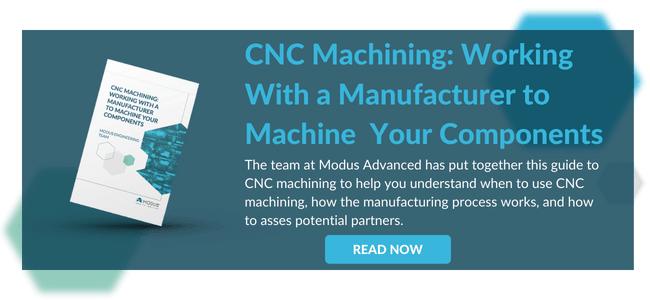Manufactured with Speed and Precision
The manufacturing capabilities you need and the engineering support you want, all from a single partner.
Submit a Design![]() Key Points
Key Points
- Investing in domestic manufacturing provides many benefits including supply chain predictability and providing much needed employment for Americans.
- Natural disasters, cyber-attacks, war, transportation failures and delays all can contribute to increased costs associated with doing business overseas.
- Working with a vertically integrated manufacturing partner means that you have direct control over manufacturing, control quality and risk, and ultimately, cost.
![]() America First.
America First.
We’ve all heard it before, and it’s turning into something of a battle cry as we navigate the tumultuous socio-political landscape post-pandemic.
If you’ve paid any attention to the global supply chain disruptions over the last few years, you’re well aware of how messy it has been to navigate. On-time delivery? Not likely. Materials in stock? Keep dreaming.
Now that we’re moving away from the chaos of the pandemic, people are realizing the importance of manufacturing within the United States and leaning in on local supply chains.
In that same vein, businesses are assessing their location strategies to protect their supply chain. A complete redistribution of their current supply chains, however, isn’t a fix-all and does carry some risk. Despite the risk, many industries would do well to reshore their manufacturing capabilities back home–here’s why:
Disruptions Drive Cost
At each step along the way of getting materials and goods from point A to point B, there is a risk of disruption. Distance exacerbates this. Supply chain disruptions aren’t just limited to the most recent global pandemic–there is an entire host of devastating occurrences that can throw a stick in the spokes, so to speak. Natural disasters, cyber-attacks, war, transportation failures and delays… the list goes on.
When any number of these disruptions occur, not only does it impact your final delivery times, but it also drives cost. At the end of the day, it comes down to whether or not your customer is willing to wait longer and/or pay a higher price. If the answer is not a resounding “yes”, it might be time to reconsider your supply chain and invest in domestic manufacturing.
-- Article Continues Below -- Read Everything You Need To Know About CNC Machining
Read Everything You Need To Know About CNC Machining
ITAR
The International Traffic in Arms Regulations (ITAR) is a United States regulation that controls the export and import of defense articles and services on the United States Munitions List (USML). ITAR applies to the actual products on the USML, defense services, and the plans or documentation used to build or support them (“technical data”). Examples of technical data include part drawings, photos, software, and other classified information related to the defense articles or services.
The purpose of ITAR is to prevent sensitive data, such as technical drawings, photos, and other classified information, from falling into the wrong hands. As a trusted partner to many defense customers, we understand that this information must be protected at all costs. We pride ourselves in being ITAR registered and operating an ITAR-compliant program.
Predictability
There’s no question that delays and disruptions aren’t going anywhere–we’ll likely see the effects of the COVID pandemic for quite some time. In 2021, we saw delays and disruptions wreak havoc on product production cycles for our customers. As we waited weeks and months for products to arrive via container ship, it became obvious how risky it is to have a supplier so far from home.
Domestic manufacturing provides a level of predictability when it comes to delivery times. By working with a vertically integrated domestic manufacturing partner, you’re more insulated from the dramatic shifts in the economy. We’re better able to insulate you from those changes with blanket PO’s for example, that help us forecast the needs of our customers for as far out as possible.
-- Article Continues Below --
Visit the Modus CNC Machining Resources Center
Buy American
In January of 2021, President Biden signed executive order 14005, “Ensuring the Future is Made in All of America by All of America’s Workers.” Commonly known as ‘Buy American’, E.O. 14005 is an attempt to strengthen the use of federal procurement to support American manufacturing. What does this mean exactly?
American manufacturing by requiring a certain percentage of goods purchased with taxpayer money to be purchased in America. As of October 2022, that percentage requirement is 60%. In 2024, it will increase again to 65%, and in 2029 it will reach 75%.
With annual procurement spending upwards of $600 billion, that translates to a lot of money being spent within our border walls in support of domestic manufacturing.
Modus: Invested in Domestic Manufacturing
As a vertically integrated manufacturing partner, it’s no surprise that we’re advocating for investing in domestic manufacturing. Vertical integration means that we have direct control over manufacturing, so that we have the ability to control quality and risk, and ultimately, cost.
While the global supply chain won’t disappear overnight, nor should it, offshore manufacturing will likely see a large decrease over the coming years.
It’s more important now than ever to invest in domestic manufacturing partners. Consider shifting as much as possible to the domestic landscape to avoid the pitfalls of doing business internationally.
If you’re looking for a vertically integrated and proudly American manufacturer, look no further. Modus Advanced, Inc., is here to serve the needs of our customers. Give us a call or contact us today.


